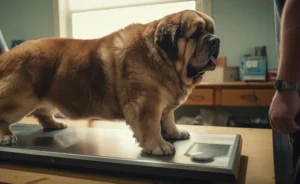-
Kutchina service center, Kolkata - 700010
Kutchina service center, Kolkata - 700010

Learn about obesity in pets and prevention, at the Best Pet Clinic in Kolkata. Learn the signs, causes, and tips for managing your pet’s weight.
[ez-toc]
Obesity, nowadays, is a huge matter of concern among pets as it goes on to affect their health condition as well as their quality of life. Just like in humans, pets also face the after-effects of obesity. Such after-effects trigger an array of health complications, including joint diseases, diabetes, and even a decrease in their lifespan. Knowing how to detect and avoid obesity in pets is of equal importance to every pet owner. We shall examine signs of obesity, its impact on your pet’s health, and the ways to effectively prevent and manage it in our guide.

Pet obesity is the state where a pet exceeds body fat, usually as a result of overeating, lack of exercise, or both. This means that obesity is not just a cosmetic but an actual health problem resulting in chronic conditions. For this reason, it is a matter that requires close observation by the pets’ owners.
As pets gradually gain weight, it is not easy to determine the point of obesity. However, in reality, there are some common signs as outlined below.
Another easy method to check your pet for excess weight is by feeling their ribs. It is usually not so difficult to touch your pet’s ribs. If the ribs are hard to find or feel like they’re hidden under a layer of fat, that might be an indicator of excess weight.
An ideal pet should have an easily viewable waistline from the top. If your pet type is round or stout without any visible definition of a waistline, then he might be overweight or even obese.
Obesity also leads to lethargy among pets. If your dog looks less active than the time when he used to play, then he might be an obese dog and lacks energy due to excessive weight gain.
Overweight pets find breathing cumbersome because of the extra weight their respiration has to support.
Too much weight on the pet causes a lot of strain on the joints, which in return causes stiffness and discomfort, mainly to aged pets.

First and foremost, one needs to identify the real reasons behind the problem if it is to be addressed. Among the most common reasons why pets are overweight include the following:
Overfeeding pet animals is one of the major causes of obesity. Overfeeding occurs when the calories taken in through feeding are more than the calories burned.
Obesity can also come from a pet having inappropriate exercises. Pets cannot scour for food and work their bodies. A pet not exercised will either stay indoors or lead a sedate life.
Some breeds are more prone to obesity due to their genetics. However, even those pets can remain slim if properly taken care of.
Some pets become obese due to hidden health problems, including hypothyroidism or diabetes.
Prevention is better than cure, and with the right strategies, you can keep your pet healthy and slender for life.
Regular exercise is one of the best methods for the prevention of obesity in pets. It burns calories and keeps them active physically and mentally.
A balanced diet helps to ensure that your pet is offered proper nutrition. Overfeeding will lead to weight gain, and underfeeding will result in malnutrition.
Regular visits to the veterinarian can be useful for monitoring the weight status of your pet and overall health. Your veterinarian can provide you with personalized recommendations concerning diet, exercise, and lifestyle that may help in preventing obesity.
One way many extra calories find their way into your pet’s diet is through treats. If you do give your pet treats, ensure they are healthy and low in calories.

Overweight puts your pet’s health and well-being at risk. It stresses the organs and joints and leads to chronic diseases.

A1: You can determine your pet’s body condition by feeling his ribs, checking for a waistline, and also his energy. Still in doubt? Discuss the assessment with your veterinarian.
A2: Yes. Obesity can be treated in pets through alterations in diet, more exercise, and programs for weight management. Consult your veterinarian for guidance on individual treatment.
A3: Yes, some breeds predisposed to obesity include Labradors, Beagles, and Dachshunds. These pets can be kept at normal weight by enforcing regular exercise and a proper diet.
A4: Yes, at times due to hypothyroidism, insulin resistance, or Cushing’s disease, a pet may develop obesity. The diagnosis is best done by a veterinarian, and the disease is also treated accordingly.
Another serious pet health condition that can be treated effectively with the right approach is obesity. Regular exercise, a well-balanced diet, portion control, and frequent visits to a veterinarian can all help keep your pet in shape, healthy, and well-weighted. And if you find your pet showing signs of obesity, it would be best to approach the Best Pet Clinic in Kolkata for specific advice and treatment. Take proactive steps today and your pet shall thrive throughout a long, healthy life.
Everyone says that a healthy pet is a happy pet. So, make sure you’re doing everything in your power to keep your furry friend from becoming an invalid before you even get it home.